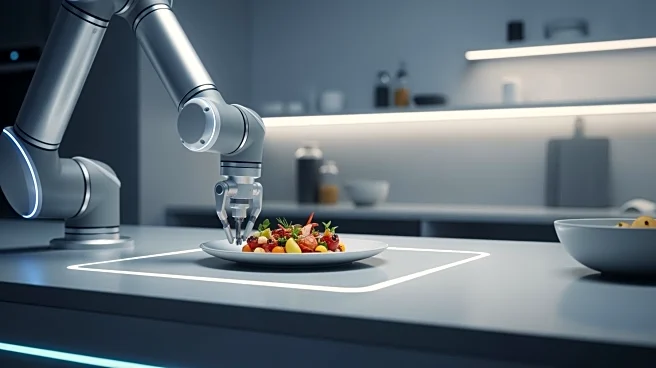What's Happening?
Appetronix, a startup specializing in robotic kitchens, has raised $6 million in a seed plus round led by Donatos Pizza founder Jim Grote, the Grote family, and AlleyCorp. This funding brings the company's
total to $10 million. Founded in 2020 by Nipun Sharma, Appetronix has launched an automated pizza kitchen at Columbus International Airport in partnership with Donatos, a premium pizza chain. The company plans to use the funds to expand its partnerships and develop robotic kitchens for various cuisines, including Asian noodle bowls and Mexican burrito bowls, in high-traffic locations such as airports and hospitals.
Why It's Important?
The automation of foodservice environments is seen as a solution to reduce labor costs, which have been exacerbated by the COVID-19 pandemic. Appetronix's approach, inspired by factory automation rather than traditional kitchens, aims to deliver high-quality food efficiently. By partnering with established brands like Donatos, the company leverages brand recognition to attract customers. The revenue-sharing model with partners ensures that each stakeholder benefits from the sales generated by the robotic kitchens, potentially revolutionizing the quick service restaurant industry.
What's Next?
Appetronix plans to outsource manufacturing to Asia to meet the growing demand for its robotic kitchens. The company is in advanced discussions to expand its production capabilities. As the technology proves reliable, Appetronix anticipates increased interest from various sectors, including theme parks and gas stations, which could lead to further partnerships and deployments. The focus remains on quick service environments where automation can enhance efficiency and customer experience.
Beyond the Headlines
The development of robotic kitchens raises questions about the future of employment in the foodservice industry. While automation can reduce labor costs, it may also impact job availability for traditional kitchen roles. Additionally, the integration of AI and robotics in food preparation could lead to new standards in food safety and quality control, potentially setting a precedent for other industries to follow.










